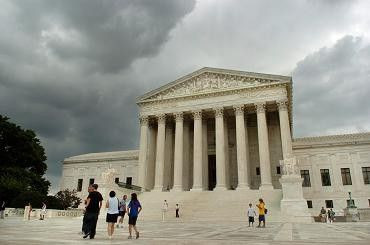Supreme Court Hears Case Affecting Certain Insider Trading Claims

The Supreme Court heard arguments Tuesday on a case that could affect the number of insider trading cases seeking a return of short-term stock profits to a company.
The case in the high court concerns whether the 1934 Securities Exchange Act requiring corporate insiders to disgorge profits and report so-called "short-swing" stock trades includes a strict, two-year statute of limitation on filing lawsuits.
One investor had targeted in 54 lawsuits profits of underwriters--major financial institutions including Credit Suisse, Bank of America and Goldman Sachs, among others--of initial public offerings during the dot-com boom in the late 1990s and early 2000s.
Since these financial institutions never reported their short-swing trades to the Securities and Exchange Commission, the statute of limitation was pushed back, plaintiff attorneys said.
Christopher Landau, arguing on behalf of the financial institutions, said that Congress was clear that the insider trading provisions included a statute of repose, that is, a strict form of the statute of limitations that cannot be extended because of fraud, for instance.
Congress even provided repose in the "out-and-out fraud provisions" for "intentional, real hard-core insider trading," Landau argued.
"Congress wanted these trades to be reported and to have this form filed," Justice Ruth Bader Ginsburg said. "Then, why would Congress mean for it to operate to immunize a defendant who has not made that filing and who has concealed what's supposed to be reported?"
Landau argued that there were other ways to get wind of stock trades from corporate insiders, such as officers and directors.
"This is no different than the way a securities plaintiff in an out-and-out fraud case" files a lawsuit, Landau said. "And those are brought every day."
Jeffrey Tilden, representing the plaintiff, who had owned stock in the dot-com companies, argued that this case was unique because the investor suffered no injury, unlike a fraud case in which the value of a stock fluctuates to cause financial harm.
Without knowing that they were financially injured by, say, a drop in a stock price, plaintiffs in short-swing insider trading cases "does not know insider trading has occurred and won't know unless he or she is told," Tilden said.
Justice Antonin Scalia suggested that if there was no injury to a shareholder--the case in question is seeking profits from short-swing trading to go back to the companies--Congress intended for a hard two-year limit on filing lawsuits.
"One would think... it would be all the more likely that Congress would want a statute of repose," Scalia said.
© Copyright IBTimes 2024. All rights reserved.





















